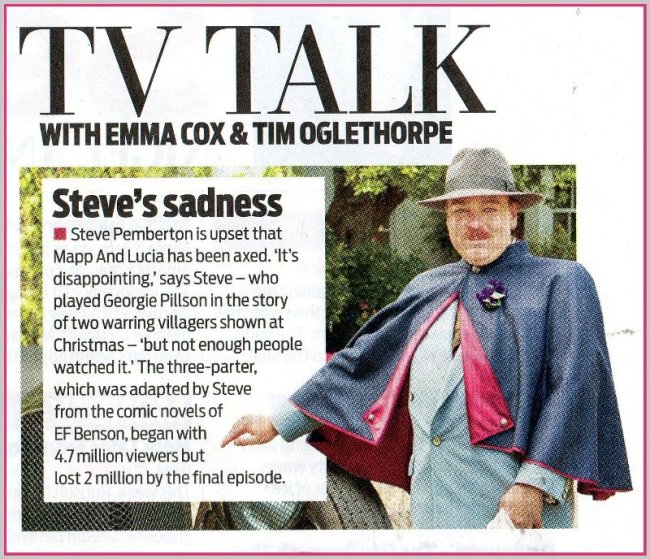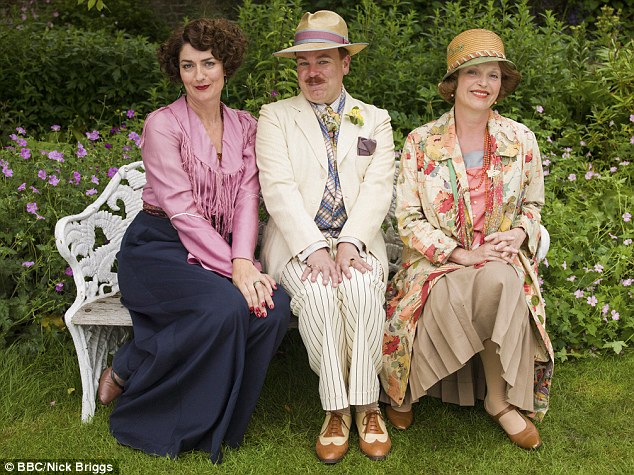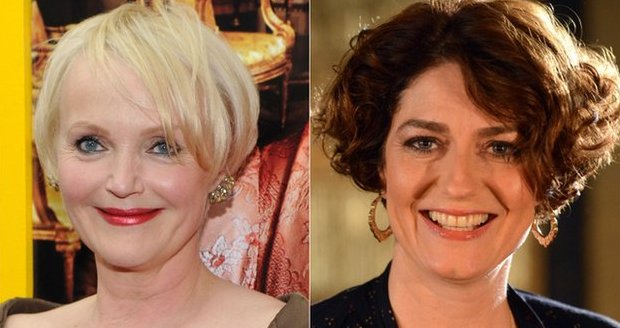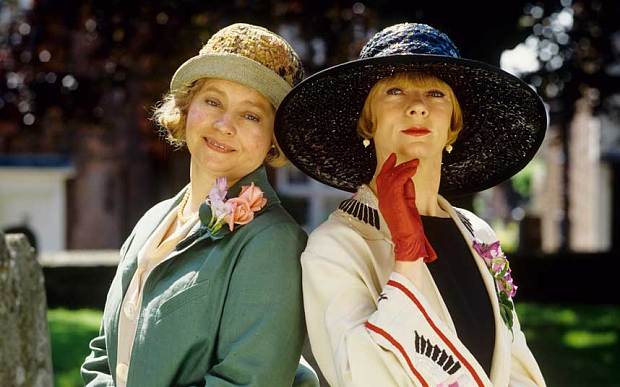Mapp & Lucia
Mapp & Lucia

Confirmation now announced that there will not be any further series of the new version of 'Mapp and Lucia' - it is a shame as it was very enjoyable, but the original, really was classier!
New version getting ever closer! From the Daily Mail

Rivals: Steve Pemberton (as Georgie Pillson) separates actresses Anna Chancellor (left, as Emmeline 'Lucia' Lucas) and Miranda Richardson (right, as Elizabeth Mapp), socialite rivals in new TV show Lucia and Mapp
Mapp And Lucia are back... with Duck Face and Queenie starring as waspish social rivals in an eagerly awaited BBC adaptation of the E F Benson comic novels
It is only fitting that actresses Anna Chancellor and Miranda Richardson are being kept apart by co-star Steve Pemberton. For the two actresses are playing waspish social rivals Mapp and Lucia in an eagerly awaited BBC adaptation of the much loved comic novels by E. F. Benson. The three-part drama, which stars Miss Chancellor as Emmeline ‘Lucia’ Lucas and Miss Richardson as Elizabeth Mapp, has been written by Pemberton, who co-stars as Georgie Pillson.
The books are set in the fictitious town of Tilling and explore the petty social snobbery of the English upper-middle classes in the 1920s and 1930s.
A previous adaptation was a huge hit for Channel 4 in the 1980s. Our exclusive photograph shows the stars during the filming of a garden scene for the BBC1 drama. (Memorable TV)
Miss Richardson, who played Queenie in Blackadder, said: ‘I cannot wait to get my teeth into Mapp… and of course, Lucia!’ Miss Chancellor, best known as Duck Face in Four Weddings And A Funeral, added: ‘I am thrilled to be playing the glorious Lucia. I hope I can do justice to E. F. Benson’s wonderful creations.’
DVD cover for the television series starring Geraldine McEwan, Prunella Scales and the late Nigel Hawthorne
The original television series was brought to our screens by my first Drama Plays Producer, Gerald Savory, with whom I worked on all 26 episodes of the ill-fated 'Churchill's People' based on the volume of books of the same name which were Winston's oeuvre. My love of the original and follow-on books is chronicled in the Books Preferences section. I'm also delighted to have discovered a recent news update which announces that a new television (this time BBC) version is soon to be produced. Steve Pemberton is to adapt the books.
BBC One has announced that it is working with Steve Pemberton to adapt the Mapp And Lucia novels.
Written by E. F. Benson between 1920 and 1939, the popular novels mainly focused on humorous incidents in the lives of upper-middle-class British people. The books particularly revolved around the adventures of Miss Mapp and Miss Lucia, who lived in the small English town of Tilling.
Pemberton is now putting the characters into a new comic drama that "celebrates and lampoons the snobberies and pretensions of small town life".
The BBC explains: "It takes place over the summer of 1930 when Mrs Emmeline Lucas, known to her friends as Lucia, decides to take a holiday in the charming Queen Anne town of Tilling."
Steve Pemberton, who rose to fame as one quarter of The League Of Gentlemen, says: "As a long-time fan of EF Benson's Mapp And Lucia novels, I'm incredibly proud and privileged to be scripting a brand-new adaptation for the BBC.
"I feel sure viewers will relish their time in Tilling, and will enjoy watching the slyly scheming Mapp take on the gloriously haughty Lucia in a dizzying round of bitter bridge parties, devious dinners and malicious musical evenings."Benson's deplorably funny novels and cast of subversive, eccentric characters have been entertaining readers for over 90 years, and I hope to bring Tilling thrillingly to life. But be warned: this is no jolly period romp. This is a series about a war. May the worst-behaved woman win."
Mapp And Lucia, which is being made in-house by the BBC, will be directed by Diarmuid Lawrence (The Mystery of Edwin Drood) and produced by Susie Liggat (The Café).
This will not be the first time Mapp and Lucia have been brought to the screen. In 1985 and 1986 Prunella Scales and Geraldine McEwan starred in the Channel 4 series Mapp & Lucia. The two series are available on DVD.
This commission follows the success of Blandings, an adaptation of stories by PG Wodehouse, which is now in its second series.
Pemberton is currently working with Reece Shearsmith on a second series of their BBC Two comedy anthology series Inside No. 9, and is expected to return to Spain this summer to film another series of ITV sitcom Benidorm.
Mapp And Lucia will be filmed early in the summer in the Sussex village of Rye, which was the template for Benson's Tilling. It is expected to be shown on BBC One later in the year (2014).

Chancellor (right) was seen recently in The Hour while Richardson is a familiar face to Blackadder fans
To understand the English, slip away to Tilling
No one captured small-town snobbery quite like EF Benson in his Mapp and Lucia novels - from the Daily Telegraph

Sparkling: Prunella Scales and Geraldine McEwan in 'Mapp and Lucia' Photo: REX FEATURES
Lamb House, in the exquisite town of Rye in East Sussex, is a fine early Georgian property belonging to the National Trust. Henry James once lived there, as did E F Benson. It was also home, at different times, to two fictional characters: the title pair in Benson’s six Mapp and Lucia novels, written between 1920 and 1939. Miss Elizabeth Mapp, the original mistress of Mallards – as it is called in the books – rents it out for a summer to the widowed Mrs Emmeline ''Lucia’’ Lucas. Later Lucia buys the house from Miss Mapp.
Formerly attached to Lamb House was a garden room overlooking the street, in which Benson conjured the image of Miss Mapp, seated at her window “like a large bird of prey”. Here she spies greedily upon her neighbours in “Tilling”, a representation of Rye that is one of the most delicious artistic constructs in comic literature.
The BBC has recently been filming at the house, and in the autumn broadcasts a three-part adaptation, Mapp and Lucia. The books were televised by ITV some 30 years ago. I recently watched this series and was entranced by its air of serene, smiling silliness. It is very true to Benson, and will be hard to improve upon.
Nevertheless, the BBC cast of Miranda Richardson, Anna Chancellor and Steve Pemberton (who has also written the adaptation) is as good as it gets, so hopes are pretty high; not least that the books will find a new readership. They certainly deserve it. They have been admired by Noël Coward, Nancy Mitford and W H Auden. Their elegant irony is comparable with Austen, the completeness of their world with P G Wodehouse. They stand within a supremely English literary tradition, the one that takes a small community – whether it be Highbury, or St Mary Mead, or Tilling – and makes of it a microcosm, a place where society is limited but its every detail depicted with a filigree perfection.
EF Benson was born in 1867 and died in 1940. His father was Archbishop of Canterbury, while he became mayor of Rye (Lucia, who gets everything that she wants – including Mallards – is elected to the same position in Tilling). A man of soulful appearance, probably homosexual, Benson was an astonishingly prolific writer. He produced some 100 novels and – rather surprisingly, given the worldliness of his Mapp and Lucia books – a large number of ghost stories.
He also wrote biographies, including a 1932 life of Charlotte Brontë; it is richly perceptive, although its Victorian style is scarcely recognisable as that of the great chronicler of Tilling. But then Charlotte Brontë is not a subject for satire. Tilling is. Although Benson is never cruel, he is a natural satirist of snobbery and social machinations, and in his reimagining of Rye he found what all writers dream of: his perfect subject. It is remarkable that his obituary in The Times did not even mention these novels, given that they are the absolute expression of his gift.
So what is Tilling? It is home to a handful of glorious characters, in the full zest of their middle years, with private incomes of varying size that enable them – in between bridge, painting and little parties – to dedicate their time to each other’s doings. It is intensely passionate, not about love or any such nonsense, but about intrigues, grievances, and the power of knowing gossip before anybody else does. And it is, definitely, a female world. “Men don’t count for much in Tilling,” as one character says, “it’s brains that do it.” It is a recognition that stratagems, devised over tea tables, are what drive events in the town.
Nobody writes comic women better than E F Benson. Elizabeth Mapp, whose face is “corrugated by chronic rage and curiosity”, is the sturdy daemon around whom the Tilling set revolves. Lucia, spry and splendid, a Boadicea of the provinces, a life-force expending itself upon callisthenics, Italian conversation, piano (“celestial Mozartino”) and local activities, is the Mapp counterpart in her Tilling-lite home town of Riseholme.
When these two come together, they vie for supremacy in a war masquerading as a minuet. “I feel like the fourth of August, 1914,” says effete Georgie Pillson, as his friend Lucia boldly defies Miss Mapp by staging a large garden party at Mallards. Mapp’s “fixed and awful smile” when she learns that Lucia has invited inmates of the local workhouse, as well as the usual circle, is a sly hint at a Tilling beyond the known, the moneyed: very Jane Austen.
The twin goddesses command a court – Quaint Irene, a modernist painter of subjects such as “Wrestling Women”; the Wyses, who drive distances of 30 yards in their “Royce” – and each has a suitor of sorts. Major Benjy, blusteringly masculine, has a vague and drunken eye for Miss Mapp (and her money). Georgie Pillson, dandified yet dignified, is queen consort to Lucia. Despite his bibelots, his embroidery, his attempts to assert his manliness by pouring himself “a very small whisky and soda”, Georgie’s sexuality is left a delicate mystery. And this reticence, this surface that barely ripples with the surge of hints and jokes beneath, is the stamp of Benson’s sublime style.
The funniest joke of all is the central, ongoing paradox, wherein incidents of utter pointlessness – such as whether Mapp can acquire Lucia’s recipe to “Lobster à la Riseholme” – spiral into an ever more deadly significance. Benson is a poet of triviality. But his people are real; and they are dazzlingly alive, because of the joy in their creation.
“I lingered at the window of the garden room from which Miss Mapp so often and so ominously looked forth,” wrote Benson from Lamb House, as if in hope of seeing them, bustling merrily about Tilling.
Page created : 26th October 2020 (G)